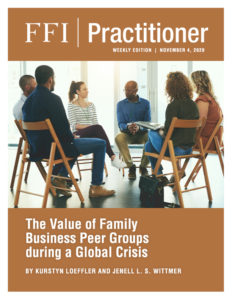
View this edition in our enhanced digital edition format with supporting visual insight and information.
Thank you to this week’s contributors, Kurstyn Loeffler and Jenell Wittmer, for their article on the potential benefits of family business leader peer groups, especially during times of crisis. These groups, which are often organized by local university-based family business centers, can be effective tools to recommend to family enterprise clients who are receptive to learning from their peers.
These individuals undertake two difficult tasks – running a business and dealing with family – at the same time. COVID-19 has added economic, safety, time, and personal stressors that could cause a family business (and family) to collapse in on itself. That’s where peer groups come in.
Family business owners and employees are unique – constantly surrounded by family and work. It can be a difficult task to locate outlets for processing frustrations or to turn to external sources of knowledge who understand family business dynamics. Family business executives and managers are not always able to pick up the phone and call their family to vent about work, they can’t necessarily go home to escape their boss, and they can’t always take a break from their co-workers, because often their bosses and co-workers are their family members. Such individuals need a healthy outlet to embrace open dialogue, to learn from others with similar experiences, to develop independent thoughts, to learn new ideas, to process and understand their work settings, and to grow as individuals outside of their family environments. And this is when times are good. What about during a global pandemic? Running a family firm is hard enough, but dealing with declining revenue, supply chain delays, employee and personal fears, all while trying to maintain a healthy family – both physically and emotionally – is an overwhelmingly stressful and daunting task.
Even with insurmountable pressures, family firms must rise to the challenge – especially since it seems we’re all relying on them. Family businesses create 78% of the jobs in the United States (prnewswire.com) and contribute to 57% of the U.S. GDP (Tharawat Magazine). However, as COVID-19 remains active throughout the world, small- to medium-sized businesses, or those with revenues of less than $500 million, are expressing their concerns, and many of these companies are family or closely-held organizations. Fifty-four percent of these firms indicate that their ability to run their business has been reduced, 53% have seen a negative impact on their income, and 49% feel their business is less secure as a result of Coronavirus (Anan). How the leaders of a family business deal with the crisis at hand determines how the employees, management, and ultimately the business will emerge following the crisis.
A useful tool in dealing with crises is the peer group, also called an affinity group. These groups help family business leaders to build and develop sources of external knowledge, and can serve as personal and professional advisory boards built for a variety of different levels within an organization. Peer groups can be created for presidents and owners, for the next generation, for companies at certain income levels – the list goes on. These groups can also be created specifically for family businesses, where the family business component is the connector (or the affinity); in this case, the group is created based on individual fit. The peer group can transcend business type while still dealing with similar family business dynamics. Such groups are typically composed of 8-10 members who meet once per month for several hours at a time, and they are either self-moderated or led by a trained moderator.
These groups help family business employees to process, understand, and handle their work environments, to develop as individuals away from family influence, and to learn through others’ successes and failures during the best and the worst of times. Having others who can discuss the challenges of employee layoffs, creative survival techniques, successfully leading remotely, the latest safety measures, and can provide stress relief is a priceless resource that many family firms lacked during the government-mandated COVID-19 shutdown. The University of Toledo Family Business Center, an organization that operates family business affinity groups, had members describe the advantages of their peer groups during this time:
The sharing of ideas with fellow business leaders is more important than ever. With the economic effects of COVID-19 taking a toll on every business, we are collaborating to find the best way to keep our employees safe and our businesses operations functioning. The diversity of backgrounds that our affinity group contains lends to interesting discussions and sharing of ideas. I don’t know any other venue where this would be possible and I am thankful for the opportunity to be part of my peer group. – Aaron Churchill, president, 2-Scale
Family businesses, by surrounding themselves with other successful families, are abiding by Aristotle’s guidance that “excellence is an art won by training and habituation.” Lifelong learning is a habit, and peer groups contribute to excellence. This is evident in the statistics recorded by Chief Executive Group in 2015 that shows, on average, companies experience faster growth and more profitability when their leaders are in peer groups. Individuals participating in peer learning experience a 5% growth rate as compared to an industry average of a 1.62% growth rate. In addition, peer group participants celebrated 22.6% operating margins, as opposed to an industry average of 10.26%. Whether a family firm is looking for success and excellence within its industry or is looking for survival techniques during a global pandemic, peer groups are an unparalleled resource:
Having a peer group during COVID as well as outside of that time as been so beneficial for me. At the beginning of May I was struggling being home and not getting out of the house. I spoke with one of the members of my group and in the first five minutes I was crying. It felt so good to be open and raw with them. I was able to get some things off my chest and realize that it was ok to have my feelings and then get some advice on how to move on from that. – Allison Hammons, risk consultant and second generation family member, Knight Insurance
Another advantage of peer groups is failure – yes, failure! This is a scary word, one that most don’t like to discuss, and certainly one that most don’t like to experience. However, failure is a great way for leaders to learn, no matter the global situation. A distinct advantage of affinity groups is that failure doesn’t always have to be your own; it can be learned from others’ disappointments. There is great benefit in discovering what has worked for others, what hasn’t, what recovery was like after a failure, and what was lost (and learned) in the process. There will certainly be many lessons learned as a result of COVID-19, but they don’t all have to be yours! Greatness surrounds itself with greatness, which is why peer groups help elevate performance and create great leaders.
At the heart of any affinity group are two key components: confidentiality and commitment. These are crucial to all peer networking groups, because without these the groups do not exist. Each individual has to be committed to the peer group process in order to progress together and to bond as a unit. In addition, the members of the group need to be able to speak openly about stressful and private issues. Confidentiality encourages vulnerability, which is also important, as vulnerability is what allows in-depth learning to occur. Vulnerability and exposure are often viewed as weaknesses by outsiders, which is yet another reason peer networks provide a healthy outlet and a safe learning environment for family business leaders. Many affinity groups successfully met during statewide stay-at-home orders through Zoom, WebEx, and other online meeting platforms. Although this is certainly not the same as meeting in person, the convenience and lack of drive-time allowed members to participate with little interruption of group meeting schedules. Confidentiality was still in place, and groups were able to call emergency meetings, speak one-on-one with other group members, or come together more than their standard once-per-month meeting with minimal effort.
My peer group gave me a chance to discuss what the media was broadcasting, and then Zoom with others in the area that were experiencing the same things I was. It was an opportunity to raise my head above the sand and see others peeking out also. My peer group was my inspiration to know we’ll get through this. – Mike Langenderfer, owner, The Countertop Shop
Family businesses are important to everyone: family members, employees, and the economy as a whole. If the country is to come out of the Coronavirus pandemic in a healthy and positive way, family firms must adjust and survive. Affinity groups are wonderful resources to help businesses no matter the environment, creating a peer learning environment like no other. Learning from trusted group members, bonding over shared experiences, and discussing issues and difficulties in a safe environment can be a powerful experience. Family firms invested in peer learning are situated to endure the Coronavirus and beyond.
“I’ve always valued my peer group, however, over the past few months with our economy’s meltdown, COVID-19 and the ripple effect these disasters have created for nearly every industry and business owner, I found my peer group to be even more valuable than ever before. The diversity of our members’ experiences and businesses helped me gain insight that I wouldn’t have had otherwise. Together we vented, we shared what worked and what failed, and in the end, grew even more committed to each other as leaders.” – Aly Sterling, president, Aly Sterling Philanthropy and author of 37
References
Anan, Lindsay, et al. “Tracking US Small and Medium-Sized Business Sentiment during COVID-19.” McKinsey & Company, 2020, www.mckinsey.com/industries/financial-services/our-insights/tracking-us-small-and-medium-sized-business-sentiment-during-covid-19#.
Björnberg, Asa. “Fine-Tuning Family Businesses for a New Era.” McKinsey & Company, www.mckinsey.com/business-functions/organization/our-insights/fine-tuning-family-businesses-for-a-new-era.
Holton, Robert. “A Critical Look at ‘Survival’ Statistics: Family Business Magazine.” A Critical Look at ‘Survival’ Statistics | Family Business Magazine, www.familybusinessmagazine.com/critical-look-survival-statistics.
Score. “Family-Owned Businesses Create 78% of New U.S. Jobs and Employ 60% of the Workforce.” PR Newswire: Press Release Distribution, Targeting, Monitoring and Marketing, 27 June 2018, www.prnewswire.com/news-releases/family-owned-businesses-create-78-of-new-us-jobs-and-employ-60-of-the-workforce-300613665.html.
Tharawat Magazine. “Issue 22, May 2014 – The Economic Impact Of Family Business.” Tharawat Magazine, 1 July 2019, www.tharawat-magazine.com/magazine/issue-22-economic-impact-family-business/.
About the Contributor

Kurstyn Loeffler is Assistant Director for the University of Toledo Family Business Center. Through the Center, she has developed family business curriculum, fostered peer group relationships, and helped to develop procedures and protocols for healthy peer learning environments. Kurstyn is a graduate of The Ohio State University and received her MBA from The University of Toledo.

Jenell L. S. Wittmer, Ph.D. is an Industrial/Organizational Psychologist and Associate Professor of Management in the College of Business and Innovation at the University of Toledo. Dr. Wittmer has received multiple awards in the areas of teaching, research, and service at the University of Toledo and she is an expert in mid and top-level executive coaching and development. She currently sits on the board of the Ohio Business Leadership Network and the UToledo Family Business Center. She has been awarded the Sage Publications/Robert McDonald Advancement of Organizational Research Methodology Award in 2014 and the Sage Best Publication of the Year Award in 2009.

View this edition in our enhanced digital edition format with supporting visual insight and information.





